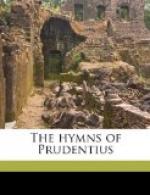Here stands the brazen laver burnished,
And there the golden goblet brightly gleams;
Hard by some crock of clumsy earthen ware,
Massive and ample lies a silver plate;
And rough-hewn cups of oak or elm are there
With vases carved of ivory delicate.
Yet every vessel in its place is good,
So be it for the Master’s service meet;
The priceless salver and the bowl of wood
Alike He needs to make His home complete.
Therefore within His Father’s spacious hall
Christ fits me for the service of a day,
Mean though I be, a vessel poor and small,—
And in some lowly corner lets me stay.
Lo in the palace of the King of Kings
I play the earthen pitcher’s humble part;
Yet to have done Him meanest service brings
A thrill of rapture to my thankful heart:
Whate’er the end, this thought will joy afford,
My lips have sung the praises of my Lord.
This edition of the Cathemerinon of Prudentius has been prepared for the Temple Classics by Rev. R. Martin Pope, M.A. (St John’s College, Cambridge, translator of the “Letters of John Hus"), who has done the translation of the Praefatio and Hymns i., ii., iii., viii., xi., xii., with notes thereon and the note on Prudentius. For the rendering of Hymns iv., v., vi., vii., ix., x., and the Epilogus with notes thereon, Mr R.F. Davis, M.A. (St John’s College, Cambridge), is responsible. The text, with some minor alterations in orthography and punctuation, is that of Dressel (Lipsiae, 1860). The frontispiece is due to the kind suggestion of Dr SANDYS, Public Orator of Cambridge University, to whom the thanks of the translators are hereby presented.
TRANSLATOR’S NOTE
AURELIUS PRUDENTIUS CLEMENS (to give his full title) was born, probably at Saragossa (Caesaraugusta), in Spain, in the year of our Lord 348. The fourth century exercised a profound influence alike on the destiny of the Roman Empire and of the Christian Church. After a long discipline, strangely alternating between fiery persecution and contemptuous toleration, the Church entered upon a new era, when in 323 Constantine, the first Christian emperor, became master of the Roman world. Two years later the Council of Nicaea met to utter its verdict on the Arian controversy and to establish the terms of the orthodox symbol. A generation later Julian took up the reins of empire and commenced his quixotic and fruitless attempt to revive the glories of Paganism. Athanasius died in 373: but fourteen years later Augustine, his successor in the championship of the faith, was baptized, and in 395, at the death of Theodosius, when the Empire was divided between Honorius and Arcadius, he became Bishop of Hippo, and was marked out by his saintliness and learning as the leader of the Western Church, which he shaped by his splendid ideal of the Civitas Dei into unity and stability, when the secular empire was falling into decay.




